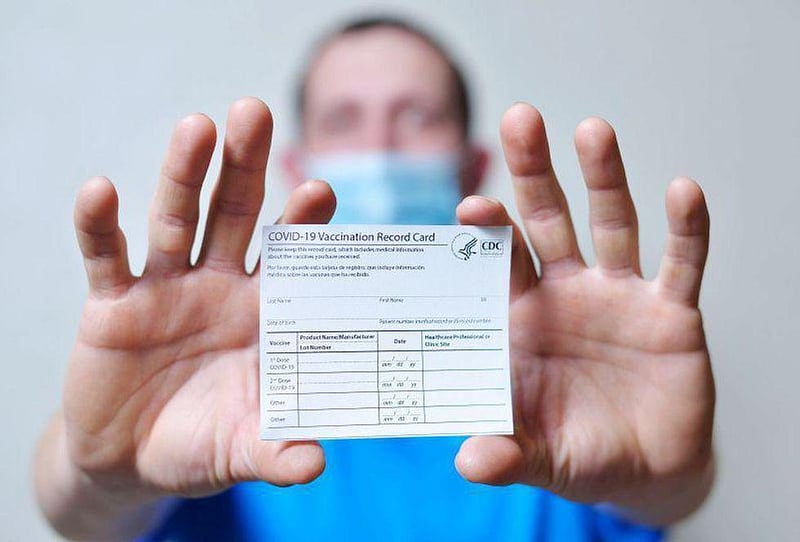Manténgase sano!

- Diane Moy and Steven Reinberg
- Posted January 7, 2022
Breakthrough COVID Cases Overwhelmingly Mild for Vaccinated People: Study
A review of cases from 465 U.S. hospitals underscores the protection provided by COVID-19 vaccines.
The new review -- by researchers at the U.S. National Institutes of Health -- found that vaccinated adults who got breakthrough infections rarely got severely ill. Respiratory failure, the need for treatment in an intensive care unit, and death were also very rare.
"Vaccines are highly effective and greatly reduce the risk of severe outcomes from COVID-19," said senior researcher Dr. Sameer Kadri, head of clinical epidemiology in the NIH Clinical Center's Department of Critical Care Medicine in Bethesda, Md.
The data covered a stretch between March 2020 and October 2021 when the severe Delta variant of SARS-CoV-2 became widespread in the United States.
Omicron, a variant that is better at evading immunity but tends to produce less severe illness, had not yet emerged.
The review included data from 1.2 million people who were fully vaccinated against COVID.
Those at highest risk for severe disease or death included people 65 and older, as well as folks with compromised immune systems or chronic illnesses, such as those affecting the kidney, heart, lungs, liver or nervous system, the study found.
For every 10,000 vaccinated patients who developed COVID, 1.5 died, and 18 had severe outcomes, according to the study. All of those who had worse outcomes had at least one risk factor leaving them vulnerable to severe COVID, and almost 8 in 10 of those who died had four or more.
In addition to getting two doses of the Pfizer or Moderna vaccine or one Johnson & Johnson vaccine, booster shots offer further protection, researchers pointed out.
The U.S. Centers for Disease Control and Prevention recommends Moderna and J&J boosters for people 18 and older and the Pfizer booster for everyone 12 and up.
"Increasing COVID-19 vaccination coverage is a public health priority," Kadri said, adding that vaccines may not only slow spread of the virus but also help prevent new variants from emerging.
For vaccinated folks with breakthrough COVID, treatment with monoclonal antibodies can effectively limit the severity of the infection, researchers said.
As new variants of the virus appear, it will be important to develop new treatments for those already vaccinated, especially for those at risk for severe disease, they added.
Several steps can help reduce the risk of serious sickness.
"To reduce the risk for severe COVID-19 outcomes, vaccinated people ages 65 years and older, people who are immunocompromised or who have other underlying conditions should receive chronic disease management care, take precautions to reduce exposure, such as wearing a mask and physical distancing, get additional primary and booster vaccine doses, and be given effective pharmaceutical therapy as needed," Kadri said.
Infectious disease expert Dr. Marc Siegel is a clinical professor of medicine at NYU Langone Medical Center in New York City. He said boosting vaccination rates is a critical public health priority.
"We need the mass of people to be vaccinated, because it decreases severe outcomes and probably decreases the spread to some extent, and more people have mild illness," Siegel said.
And, he urged, get a booster when you are eligible for one. These steps will help make a case of COVID-19 milder if you get a breakthrough infection.
"Make sure your vaccine is up to date, your boosters are up to date -- everything that you have is maximized," Siegel said.
More variants of the virus may appear, he warned. But because the Omicron variant is so highly contagious, it might suppress others.
What's needed is a vaccine that blocks the Omicron variant, Siegel said.
"I feel strongly that Pfizer and Moderna should be retooling the vaccine for Omicron," Siegel said. "They are, but it's too slow."
The new study was published Jan. 7 in the CDC's Morbidity and Mortality Weekly Report.
More information
For the latest on COVID-19, see the U.S. Centers for Disease Control and Prevention.
SOURCES: Sameer Kadri, MD, MS, head, clinical epidemiology/critical care medicine, U.S. National Institutes of Health Clinical Center, Bethesda, Md.; Marc Siegel, MD, clinical professor, medicine, NYU Langone Medical Center, New York City; Morbidity and Mortality Weekly Report, Jan. 7, 2022





